实验四 外设驱动程序设计
任务一
实验要求
- 学习资源中中全课中的“hqyj.嵌入式Linux应用程序开发标准教程.pdf”中的第十一章
- 提交康奈尔笔记
![]()
![]()

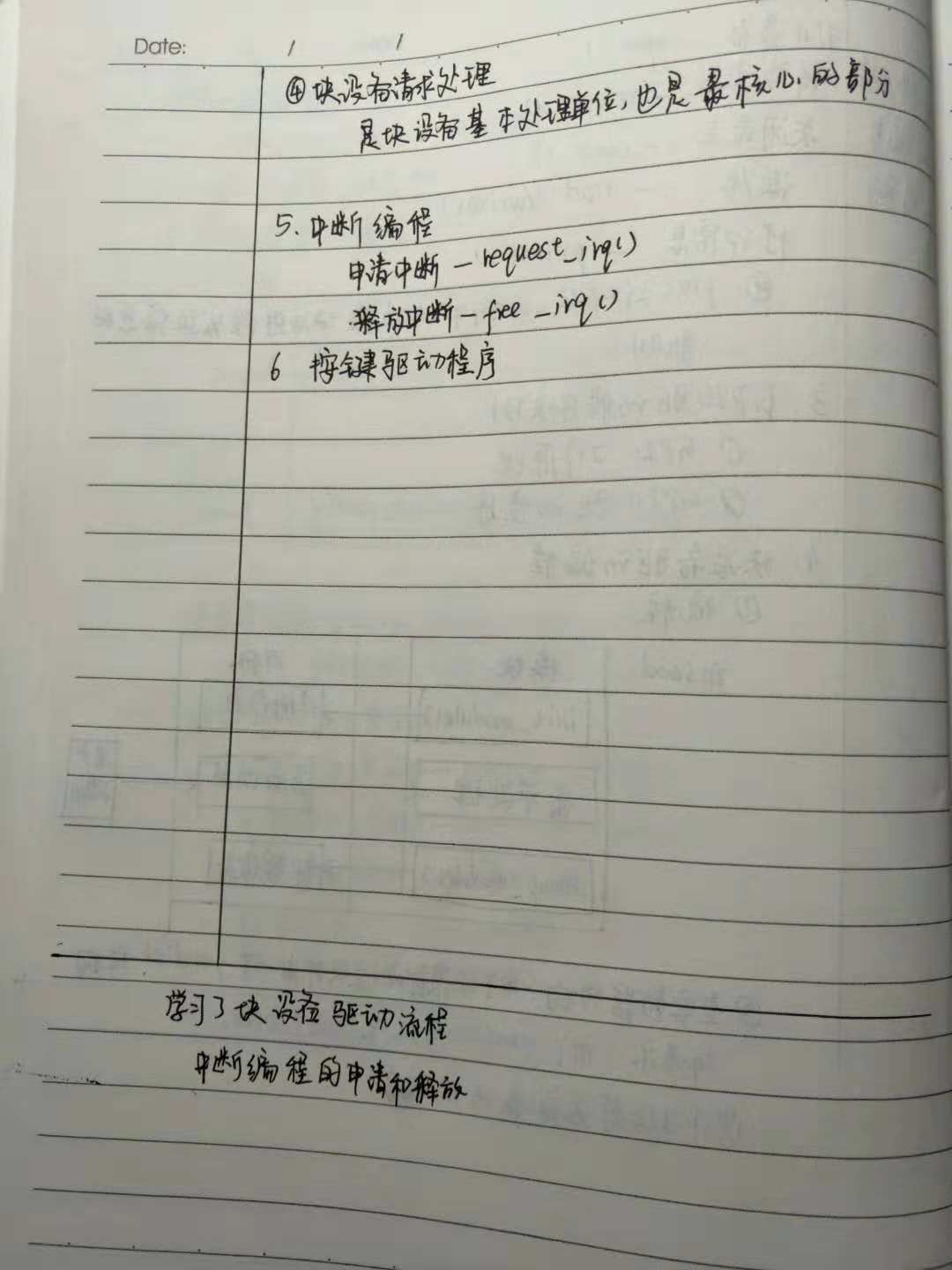
任务二
实验要求
- 在Ubuntu完成资源中全课中的“hqyj.嵌入式Linux应用程序开发标准教程.pdf”中的第十一章的test试验
- 提交编译,加载模块,卸载模块,测试运行的截图(要多张,全屏,体现学号信息)
-
实验内容
- 该实验要求实现对虚拟设备(一段内存)的打开、关闭、读写的操作,并要通过编写测试程序来测试虚拟设备及其驱动运行是否正常。
-
test_drv.c
#include <linux/module.h> #include <linux/init.h> #include <linux/fs.h> #include <linux/kernel.h> #include <linux/slab.h> #include <linux/types.h> #include <linux/errno.h> #include <linux/cdev.h> #include <asm/uaccess.h> #define TEST_DEVICE_NAME "test_dev" #define BUFF_SZ 1024 static struct cdev test_dev; unsigned int major =0; static char *data = NULL; static ssize_t test_read(struct file *file, char *buf, size_t count, loff_t *f_pos); static ssize_t test_write(struct file *file,const char *buffer, size_t count,loff_t *f_pos); static int test_open(struct inode *inode, struct file *file); static int test_release(struct inode *inode,struct file *file); static ssize_t test_read(struct file *file, char *buf, size_t count, loff_t *f_pos) { int len; if (count < 0 ) { return -EINVAL; } len = strlen(data); count = (len > count)?count:len; if (copy_to_user(buf, data, count)) { return -EFAULT; } return count; } static ssize_t test_write(struct file *file, const char *buffer, size_t count, loff_t *f_pos) { if(count < 0) { return -EINVAL; } memset(data, 0, BUFF_SZ); count = (BUFF_SZ > count)?count:BUFF_SZ; if (copy_from_user(data, buffer, count)) { return -EFAULT; } return count; } static int test_open(struct inode *inode, struct file *file) { printk("This is open operation\n"); data = (char*)kmalloc(sizeof(char) * BUFF_SZ, GFP_KERNEL); if (!data) { return -ENOMEM; } memset(data, 0, BUFF_SZ); return 0; } static int test_release(struct inode *inode,struct file *file) { printk("This is release operation\n"); if (data) { kfree(data); data = NULL; } return 0; } static void test_setup_cdev(struct cdev *dev, int minor, struct file_operations *fops) { int err, devno = MKDEV(major, minor); cdev_init(dev, fops); dev->owner = THIS_MODULE; dev->ops = fops; err = cdev_add (dev, devno, 1); if (err) { printk (KERN_NOTICE "Error %d adding test %d", err, minor); } } static struct file_operations test_fops = { .owner = THIS_MODULE, .read = test_read, .write = test_write, .open = test_open, .release = test_release, }; int init_module(void) { int result; dev_t dev = MKDEV(major, 0); if (major) { result = register_chrdev_region(dev, 1, TEST_DEVICE_NAME); } else { result = alloc_chrdev_region(&dev, 0, 1, TEST_DEVICE_NAME); major = MAJOR(dev); } if (result < 0) { printk(KERN_WARNING "Test device: unable to get major %d\n", major); return result; } test_setup_cdev(&test_dev, 0, &test_fops); printk("The major of the test device is %d\n", major); return 0; } void cleanup_module(void) { cdev_del(&test_dev); unregister_chrdev_region(MKDEV(major, 0), 1); printk("Test device uninstalled\n"); } -
Makefile
ifeq ($(KERNELRELEASE),) KERNELDIR ?= /lib/modules/$(shell uname -r)/build PWD := $(shell pwd) modules: $(MAKE) -C $(KERNELDIR) M=$(PWD) modules modules_install: $(MAKE) -C $(KERNELDIR) M=$(PWD) modules_install clean: rm -rf *.o *~ core .depend .*.cmd *.ko *.mod.c .tmp_versions .PHONY: modules modules_install clean else obj-m := test_drv.o /* 将生成的模块为 test_drv.ko*/ endif -
test.c
/* test.c */ #include <stdio.h> #include <stdlib.h> #include <string.h> #include <sys/stat.h> #include <sys/types.h> #include <unistd.h> #include <fcntl.h> #define TEST_DEVICE_FILENAME "/dev/test_dev" #define BUFF_SZ 1024 int main() { int fd, nwrite, nread; char buff[BUFF_SZ]; fd = open(TEST_DEVICE_FILENAME, O_RDWR); if (fd < 0) { perror("open"); exit(1); } do { printf("Input some words to kernel(enter 'quit' to exit):"); memset(buff, 0, BUFF_SZ); if (fgets(buff, BUFF_SZ, stdin) == NULL) { perror("fgets"); break; } buff[strlen(buff) - 1] = '\0'; if (write(fd, buff, strlen(buff)) < 0) { perror("write"); break; } if (read(fd, buff, BUFF_SZ) < 0) { perror("read"); break; } else { printf("The read string is from kernel:%s\n", buff); } } while(strncmp(buff, "quit", 4)); close(fd); exit(0); } -
test_drv_load
#!/bin/sh module="test_drv" device="test_dev" mode="664" group="david" # remove stale nodes rm -f /dev/${device} # invoke insmod with all arguments we got # and use a pathname, as newer modutils don't look in . by default /sbin/insmod -f ./$module.ko $* || exit 1 major=`cat /proc/devices | awk "\\$2==\"$device\" {print \\$1}"` mknod /dev/${device} c $major 0 # give appropriate group/permissions chgrp $group /dev/${device} chmod $mode /dev/${device} -
test_drv_unload
#!/bin/sh module="test_drv" device="test_dev" #invoke rmmod with all arguments we got /sbin/rmmod $module $* || exit 1 # remove nodes rm -f /dev/${device} exit 0
利用Makefile编译test_drv.c
- 编译:make clean;make
![]()
加载模块
- 先给脚本文件增加可执行权限:chmod +x ./test_drv_load
- 再以管理员身份运行脚本:sudo ./test_drv_load
- 加载成功
![]()
编译运行test.c
- 编译:gcc -o test.c test
- 运行:./test
- 根据提示输入信息
![]()
卸载模块
- 先给脚本文件增加可执行权限:chmod +x ./test_drv_unload
- 再以管理员身份运行卸载脚本:sudo ./test_drv_unload
实验中的问题
- 运行脚本时"open:Permisson denied"
- 解决:chmod +x ...(脚本名称)


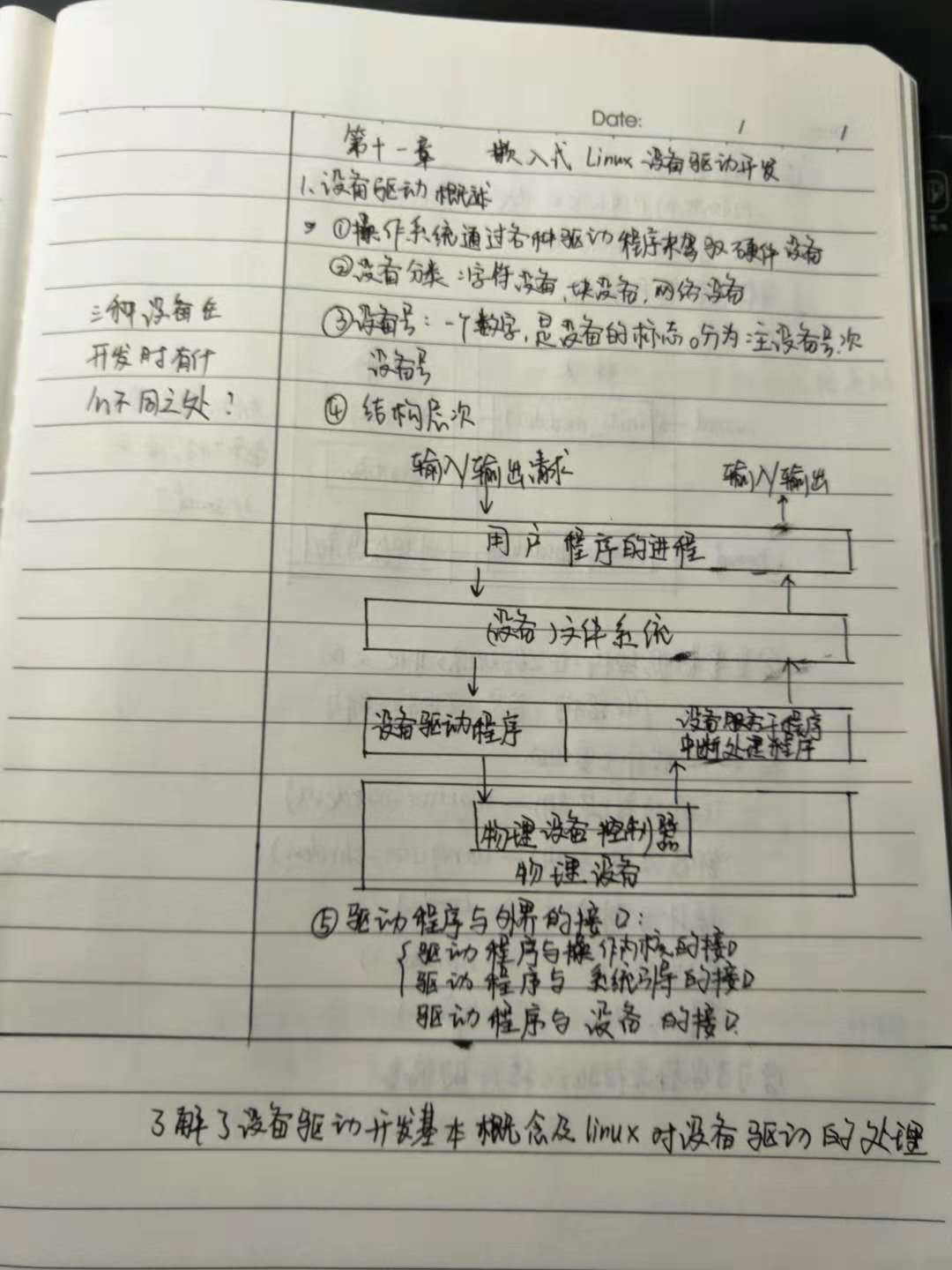
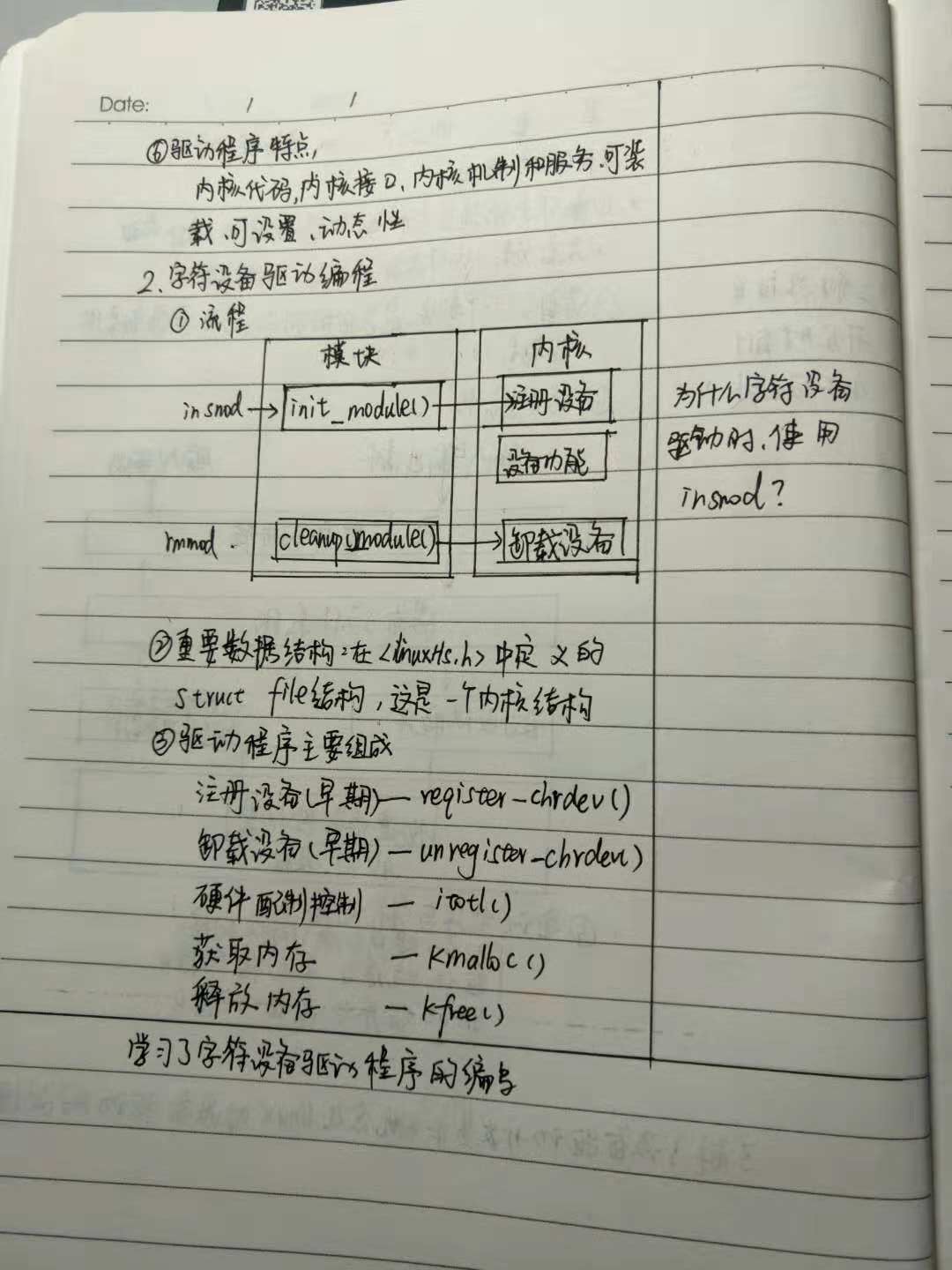

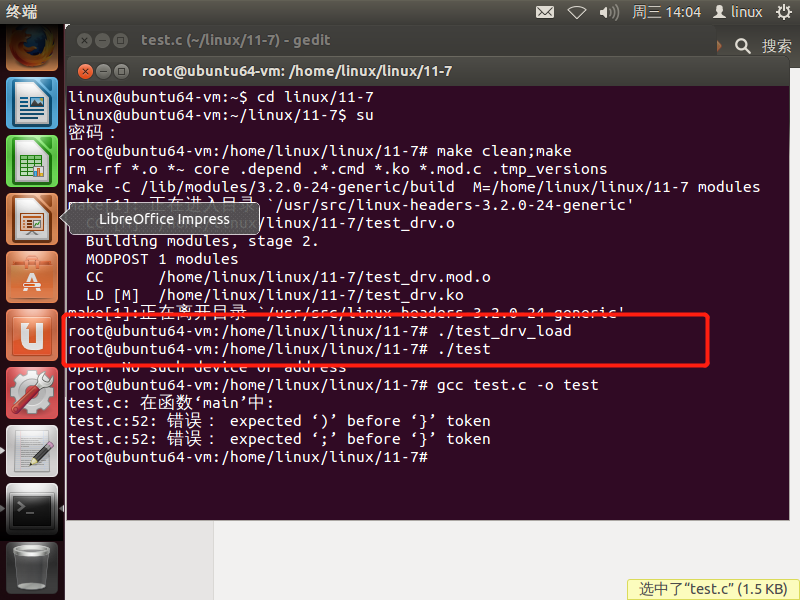
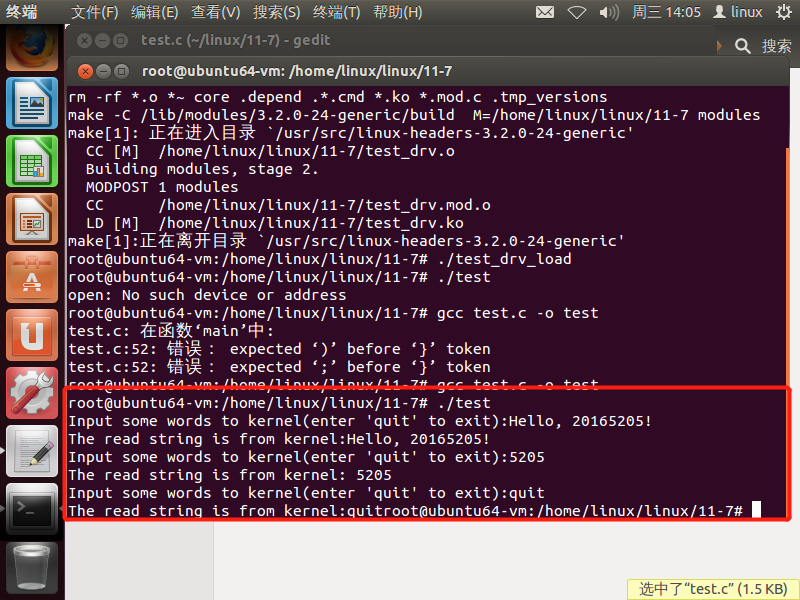

 浙公网安备 33010602011771号
浙公网安备 33010602011771号